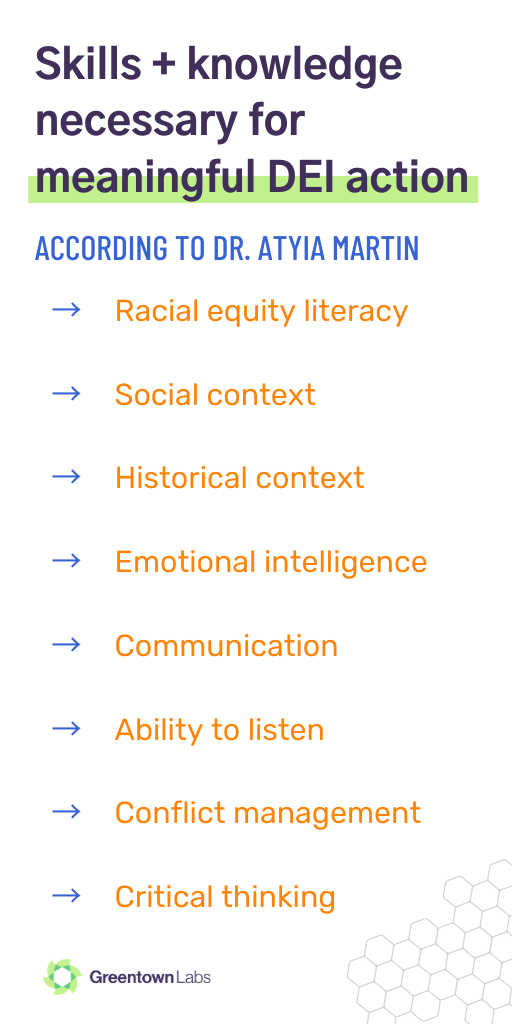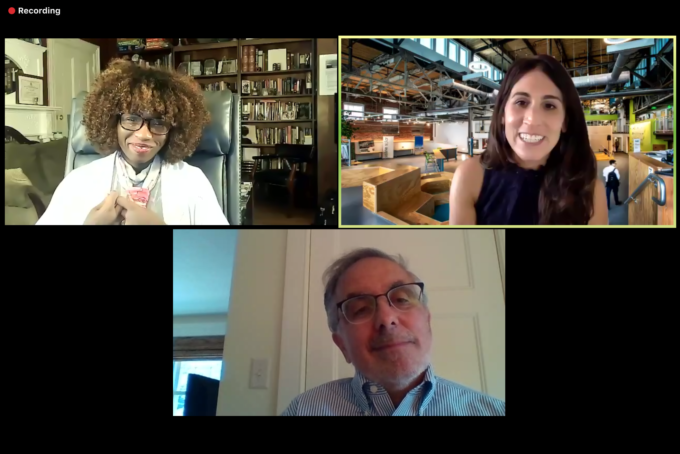Dr. Atyia Martin has worn many hats—there’s her emergency management hat, her diversity, equity, and inclusion (DEI) hat, her public health hat, even her FBI hat! When she speaks, it’s clear how her varied experiences have synthesized into what she says are the two throughlines of her career: people and equity.
Martin is the CEO and founder of All Aces, Inc., a partner to organizations in cultivating racial equity. Previously, Martin was the chief resilience officer for the City of Boston, where she worked to improve the city’s climate resilience and justice. She’s also held an impressive list of positions at other organizations, including the Boston Public Health Commission, Northeastern University, the FBI, and the Air Force.
Martin shared her experiences and advice at a Fireside Chat, in conversation with Greentown Labs’ Community Director, Maya Nitzberg and Greentown member, Moneer Azzam, who is the Principal of Beacon Climate Innovations. The event kicked off a new series, “Municipal Voices: On the Frontlines of Climate Resilience and Justice,” which brings together leaders and policymakers from municipalities, communities, and urban planning groups to discuss their efforts to build climate change resilience, with a focus on how climatetech startups can get involved.
Here’s a look at their conversation:
Azzam: Could you tell us about your experience as the first Chief Resilience Officer in Boston?
Martin: Boston was a part of the second round of cities that had chief resilience officers—it actually started as an outgrowth from the Rockefeller Foundation, which seeded a nonprofit that was called 100 Resilient Cities. Our resilience strategy was the first out of the entire international network to actually integrate racial equity and social justice in the way that we did—that it wasn’t just a statement at the beginning of the strategy, but that we looked to make it practical.
Because we don’t talk about the issues very often, it was hard for people to connect the dots between how we were framing things in climate change and the bigger concept of resilience. There was an education process around when we say “racism,” we’re not just talking about bad apples—we’re talking about a more systemic thing that includes all of us—and to be able to say how it’s connected to this bigger picture concept of resilience, and that they’re intricately related.
For a city, it’s really hard to claim that we’re resilient if everybody doesn’t have what they need to thrive and we’re not in any way addressing that gap. Then, we’re not resilient.
Azzam: What do you see as the role of cities and towns in addressing climate change and climate justice?
Martin: A city really influences, a lot of times, how people in a community understand the issues and see what opportunities there are to take action.
That’s one piece, and then the other piece is when you think about city services and all of the opportunities there are to be proactively addressing the challenges of climate change—to do the research, to understand how it’s impacting real people, and most importantly, to develop the strategies necessary to close that delta, that gap between where we are and where we need to be. So many different city departments have influence over that, even beyond the environment department. There are lots of folks from the transportation department, the public works department, public health, law enforcement. All of the departments play a role in our ability to shift the dynamics of how much and how well we take action.
Nitzberg: I know that All Aces, Inc. is an alternative to traditional diversity, equity, and inclusion consulting and professional development. I’m really curious to learn about how All Aces, Inc. approaches this work.

Martin: First of all, the most important thing you need to know about how we approach the work is that we are nerds. We took a step back from the traditional DEI, racial equity, and social justice literature and approaches and said let’s look at some of the other related issues that we see showing up that perpetuate oppression.
Basically, that means that we look at neuroscience, the way that we’re actually wired; sociology, the way that we’re conditioned to have certain expectations of other people and of ourselves; and then psychology, which is how all of that stuff influences the way that we think and, therefore, behave.
For us, the path toward having more equitable organizations really is anchored in our ability to do two things at the same time: we have to be developing ourselves and people and professionals in the work, and we have to be developing the organization. They can’t happen separately—you can’t just put a policy in place and say magically equity will come. If people don’t understand what the vision is, why it’s important, what in the world does this even have to do with me and my work, what does it have to do with the success of the organization, and what role do I play, we ultimately fall short. We’ll make some progress, but it’s not going to be what we hoped for and it will sputter, as many initiatives around DEI do. And then we’re left with the status quo stuff: events, learning sessions, one-off workshops.
I liken this work to information technology. It is not the IT department’s job to teach you how the IT applies to what you do—it is their job to provide you the tools and resources you need. You as a department, you as a person, have to figure out, “Oh, of all of these things, in order for me to accomplish what I need to get done, I need to pull from these pieces, and then I’m responsible for the implementation.” It’s not because we have an IT department, the IT just works.
For us, we’re trying to connect the dots between the skills we need as individuals and the skills and tools we need as organizations. They’re very interconnected.
Nitzberg: At Greentown Labs, we are acknowledging that there is this interconnection between racial justice and climate justice, and we also are acknowledging that we are operating in a very homogenous industry. What are some steps that we can take to effectively disrupt that space?
Martin: I would start by defining what is this ideal destination you’re trying to arrive at—what does equity look like in the space? There’s the numbers part of it, but there’s more to it than that, because even if we were able to magically open up a pipeline of people of color into the space, do we actually have organizations and a culture that are ready for diversity? You can tell from the experiences people are already having in the organization, because what happens is that people of color more viscerally and more painfully experience the problems of the organization because of racism.
The last piece is to commit to the process and the hard work it takes to figure out how we want to be as individuals but also as an organization, an industry. We have to decide those things explicitly, otherwise we fall into status quo patterns.
Azzam: What advice do you have for the climatetech startups at Greentown that are looking to serve communities? How can we help?
Martin: It’s an amazing opportunity. Oftentimes the business community feels separate from the “people community.” For businesses that are partnering with the government, it’s important to be really clear about our values, our commitments, living into them. So sometimes we have to put ourselves at risk—well no, not sometimes, all the time, we have to put ourselves at risk to make progress. So the question is, what are you willing to risk? If I’m leveraging my business to advocate on behalf of the community, then I know that could impact my ability to get contracts in the city, or that could impact my ability to be invited to certain tables. We all need to do that risk analysis for ourselves. And actually, in many cases, it’s not as bad as you think it’s going to be.
Nitzberg: Thank you so much for volunteering your time with us today, it’s truly been a pleasure. We look forward to continuing the conversation!
Martin: Have a great day, everyone. Lots of love, hope, and action to you all!
This interview has been edited and condensed for clarity and conciseness. Watch the full conversation below!


